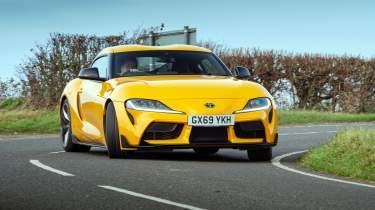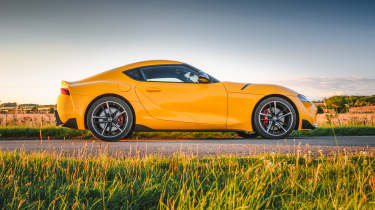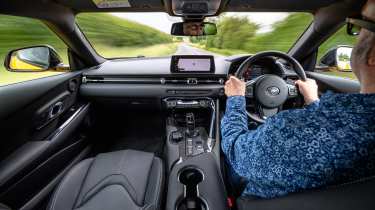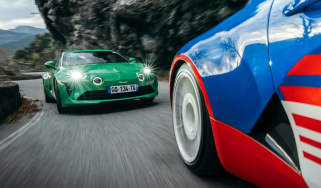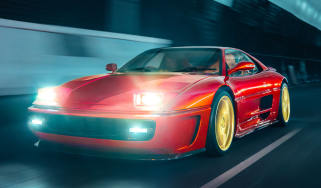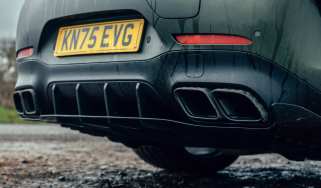Toyota GR Supra - living with it
The Supra should be very much our sort of car. But after nearly a year on our fleet, did this prove to be the case?
As potential conquest customers for the GR Supra go, I suspect I could be exactly the kind of person Toyota is looking for. I love a powerful coupe, don’t have a desperate need to impress my neighbours by having a premium badge on the car parked outside my house, and I couldn’t give two hoots about any of those Supras of old.
All of this meant I could approach the latest Supra with an open mind, and also that there was minimal risk of me getting all het up about its engine and some of the components in its cabin being of Bavarian rather than Japanese origin. Instead I could just get on with enjoying this car for what it was. But what exactly was it?
> Toyota GR Supra 2.0 Fast Fleet test – six months in the four-cylinder Porsche Cayman rival
It was certainly distinctive. When so many performance cars are based on far more humdrum machines or share a family resemblance with numerous other models, to drive a car that looks truly bespoke is really quite special. There was absolutely no mistaking the Supra for anything else, and the attention it garnered, no doubt aided by our example’s Lightning Yellow paint, was often astonishing. How many other £50k, production-line cars get smartphone videoed by the occupants of following cars?
More reviews
Group tests
In-depth reviews
Long term tests
Reviews
The Supra was also pretty decent value. Officially the 3-litre model lists at just over £54k, but there are plenty of delivery-mileage examples available from Toyota dealers for around four thousand less, and you won’t need to spend days hunting for one in the right spec either, because essentially there is only one spec: fully loaded. As standard you get everything from adaptive dampers and an active differential to a head-up display and all the usual lane-assistance tech (disabled with a single prod of a single button – hoorah!). The only variable is the paint colour: yellow being no-cost, red a £620 option, and white, silver, grey or black £710.
That fifty grand includes a six-cylinder engine, too, something that also feels special when many cars previously powered by sixes have had high-output four-pots thrust upon them instead. And what a peach the BMW B58 motor proved to be: smooth at heart, with gravelly overtones in its higher reaches, and never feeling strained, even when delivering 0-62mph in what felt like the claimed best of 4.3sec. Its headline figure of 335bhp in this application almost undersells its abilities. I’m not sure why you’d want for more power, or feel envious of the 382bhp output of US and Japanese spec Supras. Especially with the chassis as it currently is. Everyone who drove our long-termer commented on how easy it was to break traction under power, and several noted how alarmingly sudden, and often unexpected, the transition from grip to slip could be. On cold, damp asphalt, trying to get even a moderate amount of power down could become quite tiresome.
Having a torque peak of 369lb ft available from just 1600rpm certainly didn’t help, but the Supra’s suspension set-up felt lacking too. It didn’t have that locked-down feel that many great modern performance cars have – or that all the marketing bumph’s talk of racetrack honing might lead you to expect. I initially assumed this was because the GR Supra was in actuality following in the tyre tracks of its predecessors and leaning more towards being a grand tourer than a sports car, or at least trying to cover both bases, but the subsequent arrival of the GR Yaris led me to think otherwise. Said hot hatch also has a softer ride than you might anticipate, and uses it to great effect to soak up the very worst imperfections a challenging road can throw it. I now suspect that the GR team’s goal with the Supra was the same, yet while it too doesn’t give you those filling-loosening moments you might experience in a more firmly suspended car, the Supra – unlike the Yaris – can feel unsettled when the surface beneath its wheels gets complex.
It was a problem exacerbated by the eight-speed automatic gearbox, which was prone to snatchy downshifts under harder braking, which in turn had an impact upon the car’s composure and therefore your ability to place it with absolute precision. I could also never escape the nagging impression that the Supra’s structure wasn’t as stiff as it could be, the interior plastics aft of the seats relentlessly chattering like they were in a roofless car.
Together, these characteristics ultimately took the shine off the Supra for me, and also put it in the shadow of the elephant in the room: that other circa-£50k, six-cylinder, front-engined, rear-drive coupe, BMW’s M2 Competition. Having run an M2 Comp as a long-termer a couple of years ago I’m all too aware that the way it drives is in a league above: much less spiky, much more polish. And you get a full-fat M engine. As it stands, the Supra can’t touch it.
Which is frustrating, because the GR Supra is a car I really, really want to like. It’s got all the right ingredients after all, which makes me wonder if, were the clearly talented GR engineers given the opportunity to fine-tune the recipe – another go at the suspension, a remap for the gearbox – they could turn it into a car that felt truly deserving of the Gazoo Racing initials. Just imagine: a match for the M2, with looks like this. You could count me in.
> Toyota GT86 v GR86: how Toyota perfected the affordable sports car
| Date acquired | March 2020 |
| Duration of test | 11 months |
| Total test mileage | 7031 |
| Overall mpg | 29.5 |
| Costs | £0 |
| Purchase price | £54,340 |
| Value today | £36,000 |
This story was first featured in evo issue 286.

